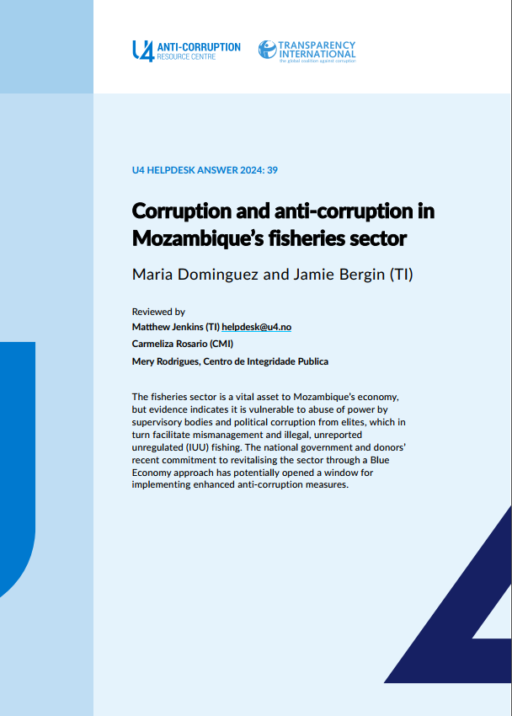
This Anti-Corruption Helpdesk brief was produced in response to a query from a U4 Partner Agency. The U4 Helpdesk is operated by Transparency International in collaboration with the U4 Anti-Corruption Resource Centre based at the Chr. Michelsen Institute.
Query
Mozambique’s maritime resources have the potential to contribute to economic growth. However, corruption, particularly political corruption and conflicts of interest, have constrained its potential to do so and has put its sustainability in jeopardy due to overexploitation. Please analyse the evolution of the situation with regard to governance and corruption problems in the sector, including to what extent current initiatives, efforts and programmes respond to these problems, and indicate possible needs for further engagement.
Summary
The fisheries sector is a vital asset to Mozambique’s economy, but evidence indicates it is vulnerable to abuse of power by supervisory bodies and political corruption from elites, which in turn facilitate mismanagement and illegal, unreported unregulated (IUU) fishing. The national government and donors’ recent commitment to revitalising the sector through a Blue Economy approach has potentially opened a window for implementing enhanced anti-corruption measures.
Key points
- Mozambique’s fisheries sector and its growth potential have been undermined by illegal, unreported and unregulated (IUU) fishing and poor governance.
- Evidence suggests corruption contributes to both, with reports that supervisory authorities collude with vessel owners to enable IUU fishing, with the integrity of regulatory bodies being affected by political appointments and undue influence.
- The tuna bonds case had profound repercussions on the sector, as business executives and elite political actors exchanged over US$100 million in bribes and conspired to embezzle most of a US$2 billion loan issued ostensibly to develop fisheries and maritime security.
- Transparency gaps in the sector flagged by a 2024 assessment by the Environmental Justice Foundation mostly pertain to a failure to make public key data, such as the beneficial ownership and geographical positioning of vessels.
- Recommendations from the literature on enhancing the anti-corruption measures harmonise around more robust oversight and inspection procedures, the closure of transparency gaps, and strengthening anti-corruption measures in key institutions.
Contents
- Background on Mozambique's fisheries sector
- Key actors
- Policy and legal frameworks
- Transparency levels and gaps
- Corruption risks in Mozambique's fisheries sector
- The Tuna Bonds case
- Countermeasures
- References
Authors
Maria Dominguez and Jamie Bergin (TI)
Reviewers
Carmeliza Rosario (CMI), Mery Rodrigues (Centro de Integridade Publica), Matthew Jenkins (TI)
Date
04/11/2024
Tags
 Download PDF
Download PDF
